Arnold ROSNER: Requiem, Op. 59
Far from being a treatment of the usual Latin, the Requiem of the New York-based Arnold Rosner (1945–2013) sets spiritual and secular texts on death from a number of the world’s cultures, including Whitman, Villon, the Tibetan Book of the Dead, a sutra from Zen Buddhism and the Jewish Kaddish. The work of a young man (Rosner was 28 when he wrote it), this Requiem is both monumental and wildly energetic – but it also encompasses passages of transcendent beauty. His musical language clothes the modal harmony and rhythm of pre-Baroque polyphony in rich Romantic colours, producing a style that is instantly recognisable and immediately appealing. Some of the music was first written for an aborted operatic treatment of Ingmar Bergman’s film The Seventh Seal, where the main character plays chess with Death; in like spirit, Rosner’s Requiem is a major statement of human defiance in the face of mortality, even if its gentle closing pages bring uneasy acceptance
Kelley Hollis, soprano (Tracks 4,8)
Feargal Mostyn-Williams, counter-tenor (Tracks 1,7)
Thomas Elwin, tenor (Tracks 1,2,7)
Gareth Brynmor John, baritone (Tracks 1,5,7)
Crouch End Festival Chorus (Tracks 1,5,6,9)
David Temple, conductor (Track 6), chorus master (Track 1,5,9)
London Philharmonic Orchestra (Tracks 1-5, 7-10)
Nick Palmer, conductor (Tracks 1-5, 7-10)
First recording
Listen To This Recording:
-
Requiem, Op. 59 (1973)
- I Overture: The Seventh Seal
- II Recitative: Ein Wort, ein Satz
- III Toccata: Musica Satanica
- IV Ballade: Les Neiges d’antan
- V Sutra: Enmei Jukku Kannon Gyo
- VI Madrigal: To All, to Each
- VII Organum: Lasciate ogni speranze
- VIII Prayer: Kaddish
- IX Passacaglia: Libera Me
- X und wieder Dunkel, ungeheuer
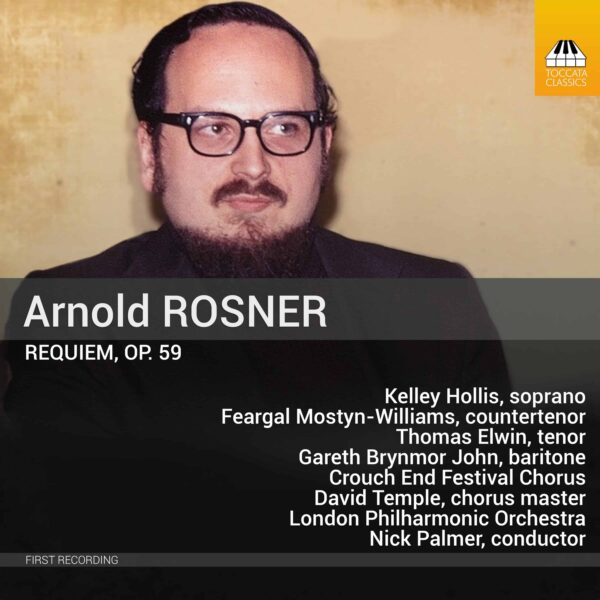
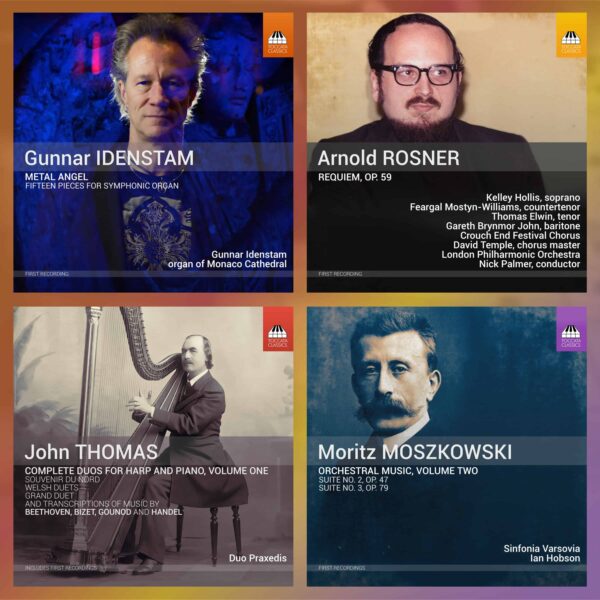
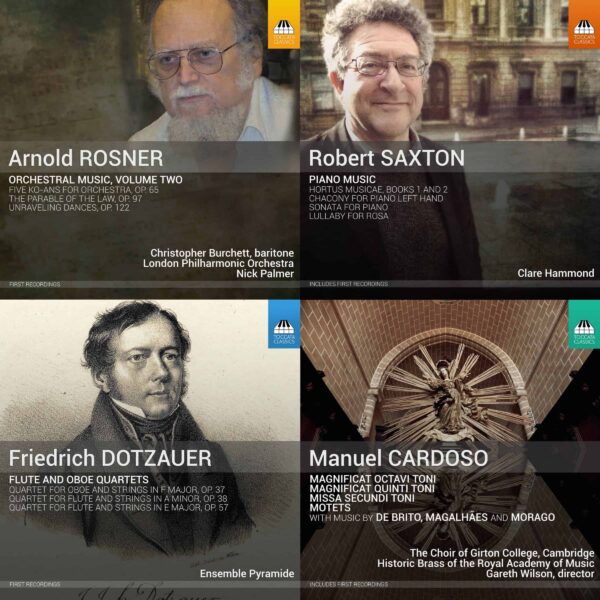
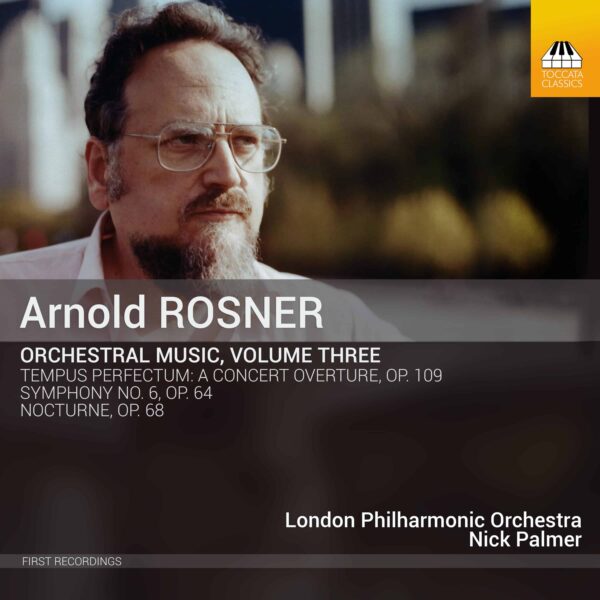
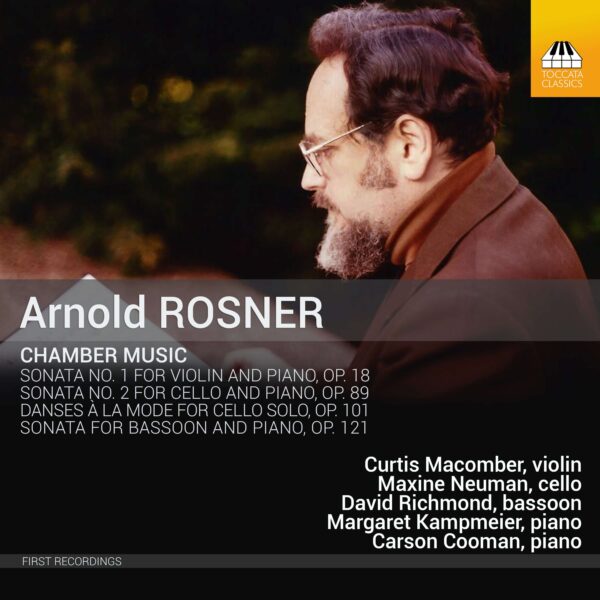
MusicWeb International :
‘As the reader will have gathered, Rosner’s Requiem is a work notable for the juxtaposition of a wide range of expressive extremes, but also for delicacy and an imaginative use of instrumental colours. I have enjoyed repeated listens very much indeed […] The orchestra plays very well and the chorus is committed. […] Toccata are to be warmly congratulated for the recording quality and their production of this very fine CD.’
—Jim Westhead, MusicWeb International
HörBar der nmz :
‘ All dies steht nebeneinander, und doch formt sich etwas Ganzes daraus. Form, Faktur und Harmonik können als unakademisch bezeichnet werden, aber vielleicht liegt gerade darin die Stärke dieser Komposition. Man muss sich darauf einlassen (können) – und die hochprofessionelle, engagierte Einspielung macht es einem leicht.’
English translation:
‘All of this exists side by side, yet something whole emerges from it. The form, texture, and harmony could be described as unacademic, but perhaps that is precisely where the strength of this composition lies. You have to be able to get involved – and the highly professional, committed recording makes it easy.’
—Michael Kube, HörBar der nmz
Cathedral Music :
‘Rosner’s frequent use of interlocking major and minor triads, timeless archaic inflexions and re-fashioned medieval and renaissance polyphony are just a few examples of the striking individuality of his music. The Requiem encompasses a wide range of expressive extremes and is undoubtedly a work for our troubled times which impels us to look beyond our Western citadel to the whole of humanity.’
—Bret Johnson, Cathedral Music
Gramophone :
‘Critics’ Choice Alert! […]
The four soloists sing immaculately but are outshone by the wonderful Crouch End Festival Chorus. The London Philharmonic Orchestra under Nick Palmer play with a verve and enthusiasm that communicates vividly, caught in demonstration-quality sound. I cannot recommend this highly enough.’
—Guy Rickards, Gramophone
Harper’s :
‘Indeed, the Requiem demonstrates precisely what makes Rosner’s music worth serious attention: his ability not just to integrate earlier styles, but in doing so to develop a distinctive, individual, and identifiable musical language that could capture a vast range of feelings and moods, from spiritual rapture to explosive brutality. Even as it juxtaposes emotional extremes, the Requiem is remarkable for passages of orchestral subtlety that appear throughout the work. […]
In the eight years since his death, the recordings we have released have benefited from a world-class orchestra, a recording studio with the most advanced technological resources, and an experienced engineer. Since I had always believed that Rosner’s music could generate a wide following, I was not surprised by the ecstatic reviews these recordings prompted. But as I listen to them, I am struck with a deep sadness that Rosner never got to hear any of his music performed with the stunning proficiency and depth of understanding typically accorded the music of Beethoven, Tchaikovsky, or Mahler. He would have given almost anything to have experienced this.’
—Walter Simmons, Harper’s
BBC Music Magazine :
‘Arnold Rosner’s 1970s Requiem is a massive work, drawing on multiple secular and religious texts. It’s an intense experience, but certainly not without its emotional rewards.’
—BBC Music Magazine
Fanfare :
‘This is nothing less than an extraordinary musical accomplishment, written by a composer who at its composition had yet to hear a polished performance of any of his orchestral works’
—Fanfare
American Record Guide :
‘Arnold Rosner’s Requiem (1973), no exaggeration intended, is one of the great works of the 20th Century. […] Written when he was 28, the maturity and vision is striking. […] His sources include the New Testament, François Villon, the Kama Sutra, Whitman (When Lilacs Last in the Dooryard Bloomed), Dante, the Kaddish, and the Dies Irae. All are set with sensitivity and profound musicality. The London Philharmonic is great […]. Helpful notes by Rosner scholar Walter Simmons. Texts and translations. Don’t miss this.’
—Allen Gimbel, American Record Guide